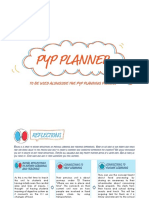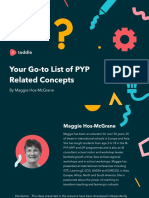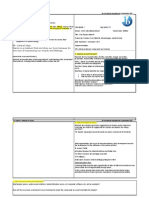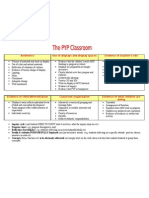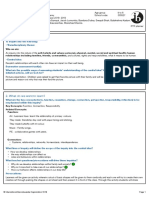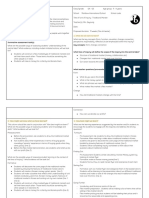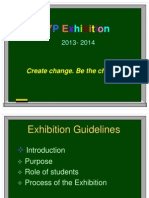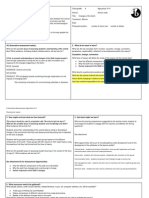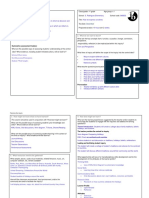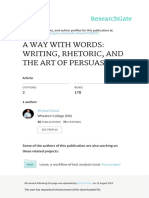Pyp Planner Template
Pyp Planner Template
Uploaded by
Taha BandealiCopyright:
Available Formats
Pyp Planner Template
Pyp Planner Template
Uploaded by
Taha BandealiOriginal Title
Copyright
Available Formats
Share this document
Did you find this document useful?
Is this content inappropriate?
Copyright:
Available Formats
Pyp Planner Template
Pyp Planner Template
Uploaded by
Taha BandealiCopyright:
Available Formats
Planning the inquiry
1. What is our purpose? To inquire into the following: transdisciplinary theme
Class/grade: School: Title: Teacher(s):
Age group: School code:
PYP planner
central idea
Date: Proposed duration: number of hours over number of weeks
Summative assessment task(s): What are the possible ways of assessing students understanding of the central idea? What evidence, including student-initiated actions, will we look for?
2. What do we want to learn? What are the key concepts (form, function, causation, change, connection, perspective, responsibility, reflection) to be emphasized within this inquiry?
What lines of inquiry will define the scope of the inquiry into the central idea?
What teacher questions/provocations will drive these inquiries?
International Baccalaureate Organization 2007
Planning the inquiry
3. How might we know what we have learned? This column should be used in conjunction with How best might we learn? What are the possible ways of assessing students prior knowledge and skills? What evidence will we look for?
4. How best might we learn? What are the learning experiences suggested by the teacher and/or students to encourage the students to engage with the inquiries and address the driving questions?
What are the possible ways of assessing student learning in the context of the lines of inquiry? What evidence will we look for?
What opportunities will occur for transdisciplinary skills development and for the development of the attributes of the learner profile?
5. What resources need to be gathered? What people, places, audio-visual materials, related literature, music, art, computer software, etc, will be available?
How will the classroom environment, local environment, and/or the community be used to facilitate the inquiry?
International Baccalaureate Organization 2007
Reflecting on the inquiry
6. To what extent did we achieve our purpose? Assess the outcome of the inquiry by providing evidence of students understanding of the central idea. The reflections of all teachers involved in the planning and teaching of the inquiry should be included.
7. To what extent did we include the elements of the PYP? What were the learning experiences that enabled students to: develop an understanding of the concepts identified in What do we want to learn? demonstrate the learning and application of particular transdisciplinary skills? develop particular attributes of the learner profile and/or attitudes?
How you could improve on the assessment task(s) so that you would have a more accurate picture of each students understanding of the central idea.
In each case, explain your selection.
What was the evidence that connections were made between the central idea and the transdisciplinary theme?
International Baccalaureate Organization 2007
Reflecting on the inquiry
8. What student-initiated inquiries arose from the learning? Record a range of student-initiated inquiries and student questions and highlight any that were incorporated into the teaching and learning.
9. Teacher notes
At this point teachers should go back to box 2 What do we want to learn? and highlight the teacher questions/provocations that were most effective in driving the inquiries.
What student-initiated actions arose from the learning? Record student-initiated actions taken by individuals or groups showing their ability to reflect, to choose and to act.
International Baccalaureate Organization 2007
You might also like
- Bha Maths POIDocument2 pagesBha Maths POIDave Secomb100% (5)
- IB Unit Planner: Who We Are With AssessmentDocument6 pagesIB Unit Planner: Who We Are With AssessmentMaryanne Oxenrider Lipovsky94% (16)
- Pyp 5 Unit 1 21-22 NewsletterDocument4 pagesPyp 5 Unit 1 21-22 Newsletterapi-516787540No ratings yet
- 9 Stage Planner On Where We Are in Place and TimeDocument4 pages9 Stage Planner On Where We Are in Place and TimeRaj Kumar M75% (4)
- PYP Planner - InventionsDocument4 pagesPYP Planner - Inventionsdanny100% (14)
- IB PYP ATL Scopes and SequencesDocument2 pagesIB PYP ATL Scopes and SequencesSCress100% (6)
- Pyp Exhibition Planner Helsingborg DenmarkDocument11 pagesPyp Exhibition Planner Helsingborg Denmarkapi-27921376689% (9)
- PYP Unit Planner G1 Who We Are 2014Document4 pagesPYP Unit Planner G1 Who We Are 2014Shelby Nail88% (8)
- Unit 4 Where We Are in Place and Time Grades 3 4 Sy 2013-2014Document8 pagesUnit 4 Where We Are in Place and Time Grades 3 4 Sy 2013-2014api-26437308333% (3)
- Kinder How We Express Ourselves Sy14-15Document7 pagesKinder How We Express Ourselves Sy14-15api-256382279100% (3)
- Elder Paisios of Mount Athos by Elder Isaac: Read Online and Download EbookDocument7 pagesElder Paisios of Mount Athos by Elder Isaac: Read Online and Download EbookIordache Adrian0% (3)
- PYP Unit Planner SampleDocument4 pagesPYP Unit Planner Samplemelania.m.224359100% (1)
- PYP Exhibition Manual PDFDocument38 pagesPYP Exhibition Manual PDFHansIsaiahWongNo ratings yet
- Enhanced PYP - Unit Planner PDFDocument1 pageEnhanced PYP - Unit Planner PDFManageBac100% (2)
- Exhibition Timeline Example 2Document1 pageExhibition Timeline Example 2api-279213766100% (1)
- IB-PYP Sample Programme of InquiryDocument4 pagesIB-PYP Sample Programme of InquiryHeppy Mutammimah100% (1)
- How We Organize Ourselves Grades 3 4 Sy 2012-2013Document7 pagesHow We Organize Ourselves Grades 3 4 Sy 2012-2013api-264373083100% (2)
- Kinder Where We Are in Place and Time Sy14-15Document7 pagesKinder Where We Are in Place and Time Sy14-15api-256382279100% (3)
- How We Express Ourselves - PlannerDocument4 pagesHow We Express Ourselves - Plannernepaliain89% (9)
- PYP Planner BlankDocument4 pagesPYP Planner BlankAnita AdnanNo ratings yet
- Difference Between Policy and StrategyDocument4 pagesDifference Between Policy and StrategyAbu Taleb83% (6)
- Unit 3 Planner - How We Express OurselvesDocument31 pagesUnit 3 Planner - How We Express OurselvesJona Cajala100% (1)
- Your Go To List of PYP Related ConceptsDocument26 pagesYour Go To List of PYP Related ConceptsRomano Luis100% (3)
- Vis Ib Pyp Visit Agenda RevisedDocument5 pagesVis Ib Pyp Visit Agenda Revisedapi-267835665No ratings yet
- How We Organize Ourselves 1 17 13Document4 pagesHow We Organize Ourselves 1 17 13api-147600993100% (1)
- Pyp Exhibition Planner Template Ib-1Document4 pagesPyp Exhibition Planner Template Ib-1api-279213766100% (4)
- Dear Evan Hansen Movie ScriptDocument138 pagesDear Evan Hansen Movie ScriptBudigoy Ibarra100% (3)
- G1 PE How We Express Ourselves 122345Document4 pagesG1 PE How We Express Ourselves 122345Jaydil Hermias100% (1)
- PYP ClassroomDocument1 pagePYP ClassroomCristinaNo ratings yet
- 2020-21 Kramer Pre-K Who We AreDocument12 pages2020-21 Kramer Pre-K Who We AreDavyMa100% (2)
- 1st Where We Are in Place and TimeDocument5 pages1st Where We Are in Place and Timejanan_snyder100% (4)
- Final Uoi Ib Pyp FileDocument12 pagesFinal Uoi Ib Pyp Fileapi-597568531100% (1)
- Who We Are (Relationships) 2018 - 2019 PDFDocument8 pagesWho We Are (Relationships) 2018 - 2019 PDFKirtika Mehta100% (1)
- Enhanced Planner Where We Are in Place and TimeDocument16 pagesEnhanced Planner Where We Are in Place and Timeasima100% (4)
- How We Express Ourselves 1 17 2013Document4 pagesHow We Express Ourselves 1 17 2013api-147600993100% (1)
- Planning Where We Are in Place and Time Grade 3 4 PDFDocument4 pagesPlanning Where We Are in Place and Time Grade 3 4 PDFKunal SinghNo ratings yet
- PYP 6 Who We Are NewsletterDocument3 pagesPYP 6 Who We Are NewsletteryanyuliusNo ratings yet
- Lesson Plan - How We Express OurselvesDocument16 pagesLesson Plan - How We Express OurselvesnehaNo ratings yet
- PYP Exhibition - Teacher Rubric 2Document1 pagePYP Exhibition - Teacher Rubric 2Cristina100% (2)
- How We Express Ourselves RevisedDocument1 pageHow We Express Ourselves RevisedMariana SuarezNo ratings yet
- How We Organize OurselvesDocument5 pagesHow We Organize Ourselvesapi-313149236No ratings yet
- Place and Time A3 PYP Planner in ProgressDocument4 pagesPlace and Time A3 PYP Planner in Progresstime space education100% (4)
- Pyp Exhibition Orientation For StudentsDocument10 pagesPyp Exhibition Orientation For Studentsapi-234755766100% (1)
- Who We Are Grade 4 2013-2014Document9 pagesWho We Are Grade 4 2013-2014api-264373083No ratings yet
- How We Express Ourselves 1 17 13Document4 pagesHow We Express Ourselves 1 17 13api-147600993100% (1)
- Unit 5 How The World Works Grades 3 4 Sy 2013-2014Document7 pagesUnit 5 How The World Works Grades 3 4 Sy 2013-2014api-264373083No ratings yet
- IB Unit Express YourselfDocument7 pagesIB Unit Express YourselfKathyNo ratings yet
- How We Express Ourselves - Landscape at NightDocument4 pagesHow We Express Ourselves - Landscape at NightReham0% (1)
- Pyp 5 Unit 3 NewsletterDocument4 pagesPyp 5 Unit 3 Newsletterapi-516787540100% (1)
- 1st Uoi Planner Where We Are in Place and Time 2010 2011 NewDocument4 pages1st Uoi Planner Where We Are in Place and Time 2010 2011 NewAlka SaxenaNo ratings yet
- How We Organize Ourselves UOI CommentsDocument5 pagesHow We Organize Ourselves UOI CommentsShuvraSheulyRoyNo ratings yet
- 9 Stage PlannerDocument5 pages9 Stage PlannersugunaNo ratings yet
- Sample Unit Planner For The ArtsDocument4 pagesSample Unit Planner For The Artsapi-261132454100% (1)
- Where We Are in Place and TimeDocument1 pageWhere We Are in Place and TimeMariana Suarez100% (1)
- Unit 4 Where We Are in Place and TimeDocument2 pagesUnit 4 Where We Are in Place and Timeapi-421400956No ratings yet
- Pyp Exit PresentationDocument14 pagesPyp Exit Presentationapi-185034533No ratings yet
- Pyp Exhibition Planner 2010-11 Bandung IndonesiaDocument4 pagesPyp Exhibition Planner 2010-11 Bandung Indonesiaapi-279213766100% (2)
- Bubble Planner Old Where We Are in Place and TimeDocument4 pagesBubble Planner Old Where We Are in Place and Timeayesha amanNo ratings yet
- Learning Through Inquiry LeafletDocument2 pagesLearning Through Inquiry Leafletmusic23No ratings yet
- Inquiry in The PypDocument49 pagesInquiry in The PypPima Ajah100% (3)
- P 0 Pypxx PLT 0709 1 eDocument4 pagesP 0 Pypxx PLT 0709 1 eapi-147600993100% (1)
- Seminar On Syllabi MakingDocument51 pagesSeminar On Syllabi Makingmtkho1909No ratings yet
- Contemp. Arts Module 4Document25 pagesContemp. Arts Module 4Richard JR LayaguinNo ratings yet
- Purchase Money MortgageDocument6 pagesPurchase Money MortgageJames Bradley Stoddart100% (1)
- AashtoDocument2 pagesAashtophanna100% (1)
- Electron Config Dorm LPDocument3 pagesElectron Config Dorm LPJoric MagusaraNo ratings yet
- Alucinaciones y Delirio PDFDocument10 pagesAlucinaciones y Delirio PDFNallely CardenasNo ratings yet
- PRT2008 First QuizDocument5 pagesPRT2008 First QuizKong PatrickNo ratings yet
- The Cell CycleDocument72 pagesThe Cell CycleJerry Jeroum RegudoNo ratings yet
- List of Society Latest PDFDocument42 pagesList of Society Latest PDFDr Tilak Raj MeenaNo ratings yet
- Case Study and Ethical Reasoning EssayDocument8 pagesCase Study and Ethical Reasoning Essayapi-271087867No ratings yet
- Allen Ginsberg ThesisDocument7 pagesAllen Ginsberg ThesisPaperWritersCollegeCanada100% (1)
- Jules Michelet's "L'amour" or "Love"Document368 pagesJules Michelet's "L'amour" or "Love"rsjonmoeas100% (1)
- Jurnal RespiDocument5 pagesJurnal RespiNurul Huda KowitaNo ratings yet
- Reverse BrainstormingDocument12 pagesReverse Brainstorminghemang.shroffNo ratings yet
- Chapter 3 - SampleDocument9 pagesChapter 3 - SampleHanah NavaltaNo ratings yet
- 16 Tenses (Definition, Usage, Example, Exercises)Document16 pages16 Tenses (Definition, Usage, Example, Exercises)FajarZainNo ratings yet
- Indemnity Bond Duplicate KVPDocument3 pagesIndemnity Bond Duplicate KVPMKNo ratings yet
- Le Thi Nhut Anh-CV-EngDocument5 pagesLe Thi Nhut Anh-CV-EngBánh BèoNo ratings yet
- A Way With Words I - The Modern Scholar TMSDocument83 pagesA Way With Words I - The Modern Scholar TMSAdjeNo ratings yet
- Present Simple PDFDocument4 pagesPresent Simple PDFtrajano23210% (2)
- Kage Guide (Expanded Class - Subclass Draft)Document42 pagesKage Guide (Expanded Class - Subclass Draft)João Vitor Ferrari Campassi0% (1)
- Business EtiquetteDocument16 pagesBusiness EtiquetteshivangiNo ratings yet
- Lesson 1 - Basic I EnglishDocument10 pagesLesson 1 - Basic I EnglishVictor QuintanillaNo ratings yet
- PHASE I (The Outline of The Foundation) (4-5 Weeks)Document3 pagesPHASE I (The Outline of The Foundation) (4-5 Weeks)AhmadNo ratings yet
- Week 2 CalculusDocument34 pagesWeek 2 CalculusPaul John PanganibanNo ratings yet
- Traveling Through The First Epistle of JohnDocument52 pagesTraveling Through The First Epistle of JohnAaron Garner100% (1)
- WORK ExerciseDocument10 pagesWORK ExerciseMr StefyNo ratings yet
- Mechanical Engineering CurriculumDocument8 pagesMechanical Engineering CurriculumaoguNo ratings yet





















